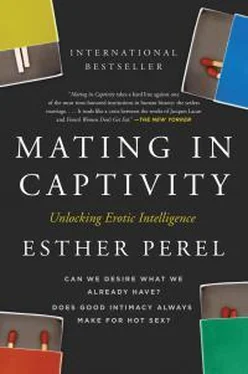When Marcus arrives at the house of his girlfriend, it’s after a long day of being the boss. With a sexually powerful woman, a dominating woman, he gets a respite from having to be in control. With his girlfriend in charge, in the role of dominatrix, he can give it up, for he knows that she can withstand the intensity of his urges. The surrender not only pleases him erotically, it nurtures him emotionally as well. Like Elizabeth, Marcus gets to experience a submerged but vital facet of himself in the erotic mirror. In our culture, passivity is perceived as female and weak. Consequently, it generates great emotional conflict for men (and for many women). But that doesn’t eradicate it from our psyche, or make it any less desirable. Marcus fears surrender as much as he craves it. His fantasy permits a bounded passivity, a safe but masked return to the mother’s arms. And while he is not interested in intellectual or heavy-duty psychological explanations of his “motivation,” his erotic inclinations challenge the stereotypical power distribution that always sees the man on top.
There Is No Love Without Hate
The defenders of modern intimacy—with marital counselors and self-help authors on the front line—have continuously sought to neutralize the thorny issue of power in committed relationships. The ideal partnership is said to be one of absolute equality in every area of the relationship, as if, with scale in hand, we could measure power quantitatively. Many of us, steeped in this ideology of fairness and mutuality, want nothing less.
But the fact is that negotiating power is part and parcel of all human relationships. We recognize it most easily when it’s expressed outright, through authority, coercion, bullying, aggression, and castigation. The powerful one metes out punishments and rewards depending on one’s degree of compliance with his or her wishes. But there is also the power of the weak. Deference, passivity, withholding, ingratiation, and the moral one-upmanship of the victim are their own manifestations of might. Power and power imbalances are inescapable.
Ethel Spector Person, in Feeling Strong , writes that we first learn about power differentials in the power grid of our families. “All power relationships, all desires either to dominate or submit, have their psychological roots in the fact that we were all once little children with big parents, and their existential roots in our feelings of being small people in an out-of-control big world that we need to be able to tame.” Childhood is our basic training for power tactics. We have our will; our parents have theirs. We demand; they object. We bargain for what we want; they tell us what we can have. We learn to resist, and we learn to surrender. At best we learn to balance, to mediate, to understand.
All these permutations of power stumble into our adult intimacies, and gender does matter. Boys and girls undergo a radically different initiation in wielding power. Men become adept at direct expressions of power, women at indirect expressions; and these differences are discernible in our sexual scripts.
As adults, we seek control in part as a defense against the vulnerability inherent in love. When we put our hopes on one person, our dependence soars. So do our frustrations and disappointments. The greater our helplessness, the more dangerous the threat of humiliation. The more we need, the angrier we are when we don’t get. Kids know this; lovers do, too. No one can bring us to the boiling point as quickly as our partner (except maybe our parents, the original locus of dependent rage). Love is always accompanied by hate.
While we fear the depth of our dependence, many of us are even more frightened by the depth of our rage. We resort to intricate relational contortions in order to keep all this combustion in check. Yet the couples who most successfully implement this model of placidity are rarely passionate lovers. When we confuse assertion with aggression, neutralize otherness, adjust our longings, and reason away our hostility, we assemble a calmness that is reassuring but not very exciting. Stephen Mitchell makes the point that the capacity to contain aggression is a precondition for the capacity to love. We must integrate our aggression rather than eradicate it. He explains, “The degradation of romance, the waning of desire, is due not to the contamination of love by aggression, but to the inability to sustain the necessary tension between them.”
Jed and Coral
Jed is unassuming. He is a clean-shaven, mild-mannered architect, brilliant and well-spoken. He is kind, never the sort of person to get in your face about anything. But sexually, he’s another man. Jed discovered S-M (sadomasochism) as a teenager, and for years he has used eroticism as a venue for aggression. He loves leather, hard surfaces, chains, handcuffs. “I used to be shy, and it was hard for me to assert myself. But at the same time I was angry a lot, and I didn’t know where to go with it. I was too afraid of hurting people, so I kept it all inside.”
“I can see why S-M was so attractive to you,” I reply. “You could make demands and not fear hurting anyone. The unambiguous codes, the negotiating beforehand, made it safe for you. Emotionally, you tend to put other people first. Sexual domination is a way for you to override the other person’s supremacy. It’s a clever answer to your more typical emotional subordination.”
“Exactly,” he says. “But at the same time, you know, it’s all about their needs. I’m pleasing them—that’s the key piece. They want it. They have to be really into it, or it’s a no-go for me.”
For years, Jed avoided getting serious with women. Becoming close felt obliterating. Haunted by the timid little boy he once was, he dreaded feeling powerless and dependent. “Coral was the first woman I ever loved who I didn’t feel indebted to. I wasn’t constantly on guard not to be sucked up by the relationship.”
Jed grew up as a loner, had few friends, and spent much of his adolescence reading science fiction and listening to heavy metal in his room. Coral, who grew up in the same neighborhood, barely remembers him from high school. She was popular, pretty, outgoing. She edited the yearbook. “I wasn’t on the A-list, but I had a perfectly respectable place.” Even today, Coral has many friends. She is the hub of her social circle, and she has plenty of interests to supplement her rising career as a documentary filmmaker.
Eleven years after graduating from high school they ran into each other at a wedding. Jed had learned to mask his shyness with satire, and Coral was drawn to his perceptiveness and offbeat sense of humor. Not to be dismissed was the fact that he had turned into a really handsome guy. She made sure to leave the party with his phone number, for she knew it would be up to her to make the first move. They started dating, and they have been together for six years.
Jed and Coral are wonderfully compatible in most areas of their life, but sexually they have very different sensibilities. “I don’t understand where his motives come from,” she says. “I’ve never come across this before, and I’ve been with plenty of men, and there are plenty of kinky things that excite me. I just don’t get this—maybe because I grew up in this very feminist world of political correctness and respect for women. In a way I feel disrespected. It feels cheap, tawdry, and it makes me feel like…”
“Like a slut?” I ask her.
“No, I don’t think there’s anything wrong with being a slut. I was a slut for a long time. It just makes me feel less desirable. I don’t feel like it’s about me. It doesn’t have anything to do with me and therefore I don’t feel connected with it or motivated by it or interested in it. Does that makes sense?”
Читать дальше










